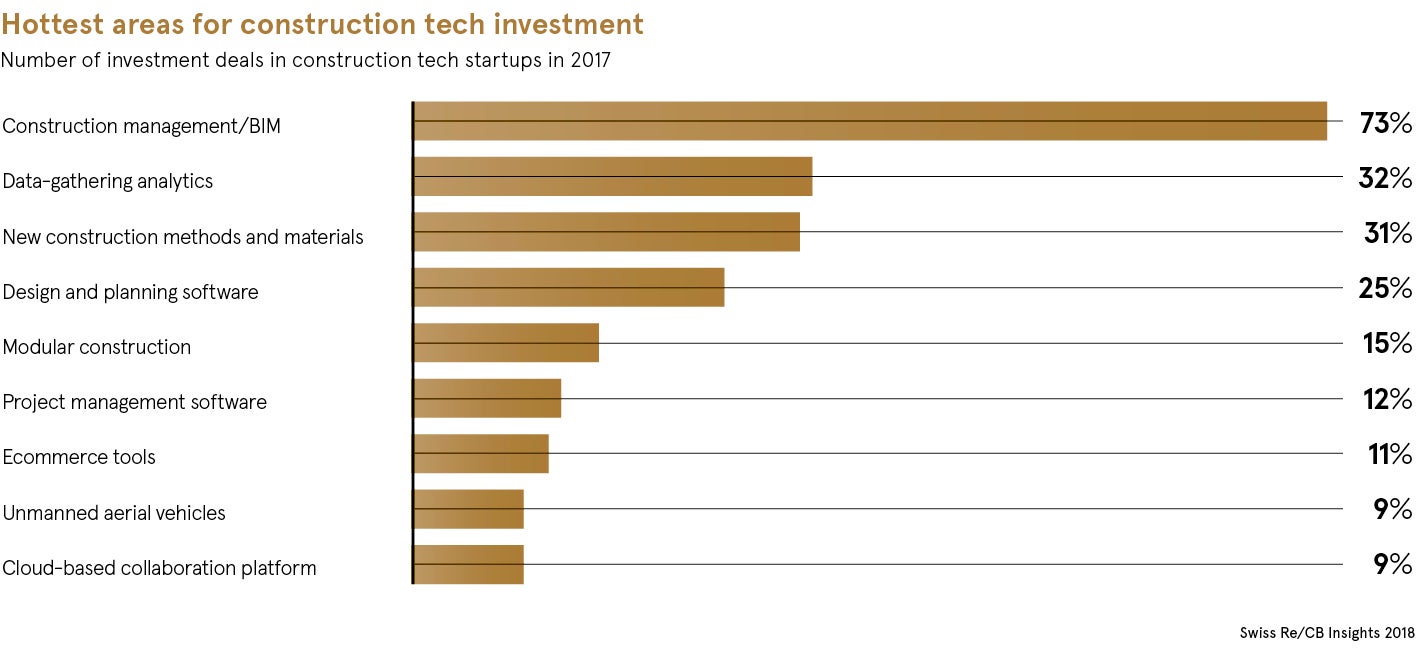The story of innovative startups disrupting traditional companies is well known. Few sectors from transportation to banking have been left untouched by cutting-edge digital solutions, but the construction industry has been slow to embrace transformative technologies, until now.
Contech is all about finding new ways to do more with less
Contech, or construction technology, startups are beginning to change the industry and are making investors take note. According to a recent report by commercial real estate firm JLL, contech firms received $1.05 billion in investment from venture capitalists in the first six months of 2018, 30 per cent up on the total raised in 2017.
Could contech boost productivity in construction?
Construction companies and investors alike are hoping these startups will help address pressing issues in the industry, especially around the relatively low levels of productivity found throughout the sector. As other industries have seen productivity levels shoot up over the past two decades, productivity in construction has been mostly flat, which is particularly troubling due to the difficulty in hiring skilled labour.
“Contech is all about finding new ways to do more with less. If a new technology can ease collaboration across firms, reduce errors and miscommunication, or get more productivity from a limited pool of skilled workers, it has a good chance of finding demand, even in an increasingly crowded market,” says Henry D’Esposito, senior research analyst, project and development services, at JLL.
Charlotte McCarthy, director of marketing and partnerships at FUTURE:Proptech, a leading property technology event firm, believes contech can support companies in everything from post-construction building management to timely admin and reporting, but there are still barriers that are set to limit the widespread adoption of these novel solutions.
“It is hard to change people’s minds and get them used to new ways of doing things, especially in traditional sectors like construction and real estate. The cost of these new solutions is not always cheap and therefore there is normally quite a lot of sign-off required to integrate unproven solutions. This will be the biggest barrier to adoption,” says Ms McCarthy.
Worries over possible glitches mean comtech adoption has been slow
Transforming from one of the least digitised industries to a leader in utilising innovative technology is clearly not going to happen overnight. Construction companies themselves often lack the necessary resources to introduce contech products and solutions into their systems effectively, delaying the time it takes to see the benefits of the technology on an industry-wide scale.
There is also concern over possible glitches in the new tech. Leading construction companies are holding back before fully embracing contech solutions until the ecosystem matures, as it’s simply too difficult to pick a winner this early.
The current crop of contech startups are being led by firms offering solutions that are speeding up the construction process and improving collaboration between disparate workers. Startups that fabricate building components off site are able to improve customer supply chains, as entire buildings can be constructed quickly when the components are received.
“One of the hottest sectors right now is off-site construction. For example, this year alone, we have seen Katerra raise nearly $1 billion in funding. Off-site construction is reaching new heights, with an 11-storey multi-family building in Denver and 13-storey property in Atlanta, both showcasing the benefits and potential scale of the technology,” says Mr D’Esposito.

Comtech key to preparing firms for a digital-first future
There have been a number of prominent examples of industry adoption of contech solutions, including firms that have been able to eliminate the need for paper files by adopting smartphone platforms or have gained in-depth insight into operations through advanced data analytics.
Big data and solutions backed by artificial intelligence are on course to become increasingly beneficial for construction businesses of all sizes. Internet of things devices are in use throughout the sector, but proliferation of this data collection is set to become a true game-changer as it provides actionable insights for firms.
Now is an exciting time for forward-thinking companies in this sector. The value added by incorporating contech products in normal, everyday operations can make a tangible difference to the entire building process and play a central part in preparing construction firms for a digital-first future.
“Construction companies should start thinking about employing a dedicated innovation director to assist with these decisions and to stay on trend. Marketing teams should be sharing information on innovation implementation on site, so they are remaining relevant, on-trend and winning through technology adoption,” Ms McCarthy concludes.
Could contech boost productivity in construction?
Worries over possible glitches mean comtech adoption has been slow






